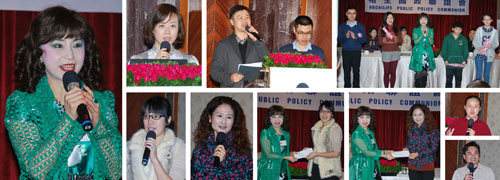
已於2016年2月21日假台北喜來登大飯店地下二樓喜廳舉行「祐生國政聯誼會」。在主持人黃晉英秘書長宣布後揭開當日活動序幕,在輕鬆、活潑的節目過後,隨即由主持人帶來重要訊息:「面對氣候異變的威脅,祐生透過"恩梯特組"進行氣候風險評估,目前台灣雖為相對安全的國家,仍應在各個面向持續推動防災減緩的工作,而明顯的劇烈溫差變化,是造成沙漠化的因子,因此對於動植物的生存造成危機。另外,近期南部強震造成大樓倒塌,提醒大家注意建築物結構的安全性及購屋時要選擇信譽佳的建設公司,此外,也請反思自己做任何事都要腳踏實地,堅持做對的事情,讓國家社會變得更好。」
The February Archilife Public Policy Communion of 2016 was held on February 21, 2016. After a series of relaxing and fun activities, Secretary General Huang Chin-ying made the following announcement, "Facing the threat of climate change, although the NT Special Team found that Taiwan is comparatively safe in its climate risk assessment, we should continue to promote various mitigation work. Big temperature differences cause desertification and threaten the survival of animals and plants. Also, as buildings collapsed during the recent earthquake in southern Taiwan, please pay attention to the safety of buildings and buy apartments or houses from constructors with a good reputation. Then, please be honest to yourself in everything and insist on doing the right thing to make the country and society better."
緊接著進行專題演講,由國政會委員陳韋名小姐主講「第二期能源國家型計劃─建構政府跨部門溝通平臺及橋接機制」。主講人首先提及此計畫為因應氣候變遷衝擊自然及人類系統所產生,第二期計畫願景為安全、效率、潔淨。主講人進一步提到四大主軸議題,包括離岸風機、碳捕獲與封存、海洋能及地熱,執行步驟為先釐清議題,界定主管機關後進行跨部會溝通。主講人特別針對跨部會溝通機制芻議進行說明,期望能建立多元層次的協調機制。最後,主講人表示於研究領域中專業分工合作的重要,並提及學術研究與政策制定間實際所面臨的差異,期望台灣能走出自己的一片天。
Next on the schedule was the keynote speech. First, Ms. Chen Wei-ming gave a presentation on "National Energy Program-Phase II: Building a Cross-Department Platform and Bridging Mechanism in the Government". First, the speaker explained that the program was implemented to address the impact on nature and the human system of climate change, and introduced the vision of the second phase: safety, efficiency, and cleanliness. Ms. Chen further mentioned the four main issues, including the offshore wind turbine, carbon capture and storage, marine energy, and geothermal energy. The implementation procedures included clarification of issues, defining competent authorities, and cross-ministerial communication, hoping to build a multiple and multilevel coordination mechanism. Lastly, she spoke of about the importance of professional division of labor in research and the discrepancy between academic research and policy making, so that Taiwan can find its own way.
接著由國政會委員張桂鳳小姐主講「屏東韌性城市案例分享─林邊養水種電與光彩溼地園區」。主講人首先介紹屏東地區地理環境與特色,並指出國土計畫與海岸保育為非都會區很重要的課題,也以永續及生態為發展重心,推動農村再生,期望建構屏東為低碳示範的生活場域。接著主講人介紹屏東的綠能計畫設置成果,在莫拉克風災之後,以危機化為轉機,透過眾人的努力及在國際趨勢與氣候變遷的條件下,啟動養水種電計畫,協助莫拉克受災農、漁民生計,解決超抽地下水導致地層下陷問題,重新發掘土地的價值。
Next, Ms. Chang Kuei-feng, a member of the Public Policy Committee, spoke on "Sharing the Experience of a Pingtung Resilient City: Electricity Farming and Water Nourishment Project and Guangcai Wetland Park in Linbian". First, the speaker introduced the geographical environment and features of Linbian and indicated that both national land use planning and coastal conservation are very important in non-urban areas. She also mentioned that rural regeneration was promoted with sustainability and ecology as the focus in regional development, hoping to turn Pingtung into a demo site for low-carbon lifestyle. Then, Ms. Chang introduced the results of implementation of Pingtung's green energy program after the attack of Typhoon Morakot. With the concerted effort of locals and based on the international trend and climate change, they activated the Electricity Farming and Water Nourishment Project to help victims (farmers and fishermen) to make a living, solve the land subsidence problem due to excessive groundwater extraction, and re-discover land value.
演講完畢,黃晉英秘書長代表基金會致贈謝禮予主講人。接著在與會者紛紛利用「餵豬時間」提出個人意見與看法互相交流後,圓滿地結束二月份國政聯誼會。
After the speech, Secretary General Huang Chin-ying presented a gift to the speakers on behalf of the foundation. Then, attendees expressed and exchanged their opinions and views during the piggy hour. The February Archilife Public Policy Communion ended smoothly.